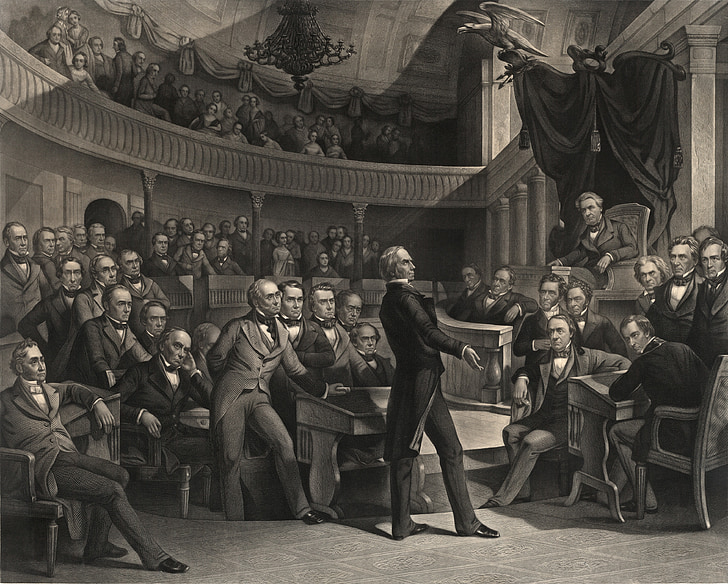Imagine your political party happens to be sending space heaters to people in the tropics. Naturally, someone not committed to your party’s platform may ask “Why?” From what I have witnessed recently on X.com, the appropriate response is to scream at them “You are so insecure you can’t even stand the idea of people different from you, living in the tropics, can you? You don’t want people in the tropics to even exist! And I bet the shape of the space heaters makes you think of your own pathetic, inadequately sized…” Well, you get the idea, and you’ve probably seen this kind of thing yourself.
What in the world is going on with this unhinged sort of response? Why don’t the people psychoanalyzing the questioner simply answer the question? And why do so many other people find these sort of responses worthy of a social media “like”?
The German-American political philosopher Eric Voegelin provided us with an illuminating analysis of this sort of “answer” to a seemingly simple question. His starting point is his characterization of ideologies as constructions of what he called, following novelist Robert Musil, “second realities,” or “dream worlds.” By that he meant that the ideologue builds an imaginary world that functions as they wish the real world would. For instance, a communist imagines a world in which people are entirely altruistic, need no motivation to work besides their desire to benefit their comrades, and have no attachment to the things they produce. This dream may describe the Kingdom of Heaven or a world entirely populated by Christian or Buddhist saints, but it fails badly in matching up to the world we actually find ourselves living in.
However, the ideologue finds meaning in their dream world that they do not find in reality, and so they wish to make reality conform to their dream rather than facing reality themselves. But what happens when reality intrudes upon the dream; when, for instance, the kulaks (Russian farmers who owned their own farms) are not thrilled to surrender all of the fruit of their labor to the dictatorship of the proletariat? In order to preserve the dream world, the ideologue must condemn reality, and those benighted enough to insist on living in reality rather than in the ideologue’s dream. As Stalin put it, the kulaks should be “liquidated.”
Here, the ideologue faces a problem: how to answer the kulaks simple question, “I put all of the work into raising these potatoes; why aren’t they, therefore, my potatoes?” As Voegelin noted, the solution was simply to forbid the asking of such questions; as he asked, “Why do [Comte and Marx] expressly prohibit anybody to ask questions concerning the sectors of reality they have excluded from their personal horizon?” One common technique by which to block questions is attacking the character of the person who dared to ask them. In the Soviet Union, the kulaks’ protests were dismissed by calling them “bloodsuckers,” “pariahs,” or “vermin.” And, of course, no one has to answer a question posed by a cockroach or a leech!
Today, we often can see the same strategy at work on social media. I would like to offer a few examples of forbidden questions that I have witnessed recently on x.com. The first one is often found “on the right” (whatever that is supposed to mean today!), and concerns vaccines.
Now, I am genuinely open to the idea that some vaccines might have harms that outweigh the benefits—pharmaceutical companies have been known to cut corners in testing! Thus, when I see posts from people who are “vigorously” anti-vaccine, I will often ask questions that seem to me to be perfectly reasonable. For instance, if I see someone claiming that pharmaceutical companies knew that their vaccines were deadly, but released them anyway, I might ask, “Why would these companies want to kill their own customers?” Of course, in a shortsighted quest for profits, a company might rush a product to market without taking reasonable care that it is not harmful. A famous case of this was thalidomide, which caused many birth defects before it was removed from the market. But the makers of the drug were not trying to cause birth defects, they were simply reckless.
Another sort of claim that I have sometimes questioned asserts that something bad that happened to someone who had been vaccinated was caused by the vaccination. An apparently healthy athlete drops dead of a heart attack during a competition. Subsequently, someone will post, “See: the vaccine killed him!” Absent any further evidence, this is clearly an instance of the post hoc ergo propter hoc fallacy. And the obvious question is “What evidence do you have that the vaccine was responsible?”
I don’t ever recall receiving a sensible response to either question. Instead, the answers are howls of outrage and vituperation. For instance, it is common that someone immediately claims that I am “in the pocket of big pharm.” Another typical response is, “If you won’t see the truth, then go ahead and get the vaccine like a good little sheep!” Well, I can assure readers that I have never received a penny from “big pharm” in my life. And whether I choose to get some vaccine or not is hardly relevant to justifying the claim that some unfortunate young person’s sudden death was caused by a vaccine they had received.
A second case, again most seen among people who consider themselves right-of-center, is the notion that seed oils, such as canola, sunflower, or soybean oil—oils very common in processed food and fried food from restaurants—are “toxic” and are causing a wide variety of ailments. For instance, one tweeter claims that seed oils:
- increase stress
- increase estrogen
- lower testosterone
- toxic [sic] to liver
- lead to inflammation
- blocks [sic] glucose use
- accelerates [sic] aging
- breaks [sic] down into toxins linked to alzheimers and cancer
Robert F. Kennedy Jr. himself claims that “seed oils are one of the driving causes of the obesity epidemic,” and that Americans are being “poisoned” by them.
One commenter on a post by Kennedy asserted that “corporate interests [have] allowed these unhealthy ingredients to dominate the food supply.” But why did the desire for profits result in these “toxic” oils winning? There must be lobbies for and corporate profits to be made in beef tallow, lard and butter, right? Why seed oils?
So I went on x.com, found the most recent discussions of how bad seed oils are for you, and repeatedly posted “Could you point me to some studies that show how bad seed oils are?”
The “answers” were enlightening. One person told me, “I could but I’m not going to.” Another charming fellow told me that if I was going to believe such nonsense as studies, “you deserve what you get—including illness and death.”
Another person replied: “Try the internet. Glad I could help.” (I pointed out to him that we were, in fact, talking on the Internet, and my question was, in fact, me “trying” it.) Someone else just sent me a picture of Judge Judy rolling her eyes with the caption “Seriously?” One person did link to five studies, but mostly they discussed hydrogenated oils, rather than seed oils per se. (And hydrogenation does, indeed, seem to produce dangerous oils.)
The best response was a link to a study that showed the problem is not seed oils per se, but the ratio of oils high in omega-6 fatty acids to those high in oemga-3 fatty acids: “The omega-6 to omega-3 ratio should be ideally 2:1 or 1:1, but for most Americans, the ratio is actually a whopping 10:1 or even 20:1.” So the only study anyone could point me to showing a genuine problem with seed oils, far from showing them to be toxic, just showed that they are over-used in our diet.
My third example arose when some people asked why Minnesota governor Tim Walz wanted to mandate putting tampons in the boys’ bathrooms of state schools. Now, there is some ambiguity as to whether the law he signed really did mandate that. (The law says that there must be tampons “in restrooms regularly used by students in grades 4 to 12 according to a plan developed by the school district.” But does that mean in all bathrooms used “by students in grades 4 to 12”? Or is it OK to have them in only certain bathrooms? It is worth noting that when Republican legislators tried to change the bill to only require tampons in girls’ bathrooms, their attempt failed.)
But for our purposes whether the law really requires tampons in boys’ bathrooms is actually irrelevant: in the discussions I witnessed, everyone, both the pro-Walzers and the anti-Walzers, was assuming that the law did require tampons in boys’ bathrooms. Rather than answer what seems to be a reasonable question, “Why should boys’ bathrooms stock tampons?” pro-Walz respondents attacked the people asking it, saying that they “are disgusted by girl’s bodies,” are “weird,” or that they want high school girls to be humiliated by bleeding through their clothes because no tampons are available. Not one of these responses answers the question asked. Granted, girls menstruate and need something to help with that event, so why not make sure tampons are adequately stocked in the girl’s bathrooms, unisex bathrooms, and in the nurse’s office as well? In the very small number of cases where someone who identifies as a boy is menstruating, that person could simply go the nurse’s office or a unisex bathroom.
What is common in these cases (and many others) is the refusal to answer simple questions: “Why put tampons in the boys’ bathroom?” or “Can you show me some studies to back your view?” or “What evidence do you have that this death was actually related to a vaccine?” Whenever we see such an avoidance of questions like these, we are witnessing someone protecting an ideological dream world.
Image via: Pickpik





4 comments
Louise
“From what I have witnessed recently on X.com…”
I think I see the problem here.
David Naas
When the Citizen’s Band Radio craze hit America, people soon found they could hide behind a mask of a “handle”, and proceeded to say mean horrible things to other people without fear of retaliation. Twenty-first Century “social media” provides the same cover for human nastiness. Amazing how the probability of getting a fist in the mouth for impoliteness tends to foster a civil social order. Contrariwise…
Brian
You have literally zero engagement on nearly every tweet, so perhaps you should try harder to find people willing to answer your questions. There’s plenty out there on both these topics.
And if you were trying to be ideologically diverse in your forbidden questions, perhaps you could ask “Why is it that the same people who say Joe McCarthy is the Most UnAmerican Man Ever, are the ones who have spent the last decade most actively accusing Trump of being a Russian agent?” or “Why is is that Big Pharma has been the biggest punching bag for the past 25+ years except for a two year period when it was completely forbidden to question one particular product or object to being forced to take it?” Go ahead and try to get sane answers to either of those.
Josh
So the first comment on the article while not vile was essentially engaging in the same line of attack as the author highlights.
Comments are closed.